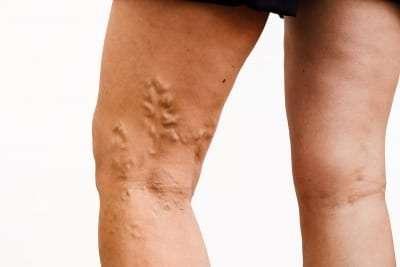Are Varicose Veins Hereditary? How Can I Get Rid of Them?
Everything to know about Varicose Veins

Title: Are Varicose Veins Hereditary? How Can I Get Rid of Them?
Varicose veins are a common condition that affects millions of people across world. Varicose veins can cause discomfort, pain, and other complications if it is not treated properly. One of the most frequently asked questions is, “Are varicose veins hereditary?” In this blog, we will explore the genetic connection, the reasons for their development, and effective ways to manage and treat varicose veins.
What Are Varicose Veins?
Varicose veins are swollen, enlarged veins that often appear twisted and bulging just beneath the skin’s surface. They commonly occur in the legs and feet because standing and walking increase pressure on the veins in the lower body.
These veins develop when the one-way valves inside the veins, which ensure blood flows toward the heart, stop working properly. This leads to blood pooling in the veins, causing them to enlarge and become visible.
Symptoms of Varicose Veins
- Visible twisted and bulging veins: Often blue or dark purple in color.
- Aching or heavy sensation in the legs: Especially after prolonged standing or sitting.
- Swelling: In the lower legs and ankles.
- Burning, throbbing, or cramping: Felt in the affected area.
- Skin changes: Discoloration or ulcers in advanced cases.
If you experience these symptoms, seeking medical advice early can prevent complications and help manage the condition effectively.
Are Varicose Veins Hereditary?
Are varicose veins hereditary? The answer is yes, genetics play a significant role in the development of varicose veins. If one or both of your parents have varicose veins, your chances of developing the condition increase significantly.
The Genetic Link:
- Weakened vein walls: Genetic predisposition can make the vein walls less elastic, leading to valve dysfunction.
- Valve malfunction: If your family has a history of poor vein valve function, it increases the likelihood of varicose veins.
- Blood flow issues: Hereditary factors can also impact overall blood circulation efficiency.
While genetics are a significant factor, other elements like lifestyle, weight, and occupation also contribute to the development of varicose veins.
Why Do Varicose Veins Develop?
- Standing or Sitting: Occupations requiring extended periods of standing or sitting can hinder proper blood flow in the veins.
- Age: As you age, veins lose elasticity, and valves become weaker, increasing the risk of varicose veins.
- Hormonal Changes: Hormonal fluctuations during pregnancy, menopause, or even while using birth control pills can weaken vein walls.
- Obesity: Excess body weight puts additional pressure on veins, especially in the lower body.
- Pregnancy: Increased blood volume and pressure on pelvic veins during pregnancy can cause varicose veins to develop.
- Injury or Trauma: Damage to the veins from previous injuries or surgeries can lead to varicose veins.
Treatments for Getting Rid of Varicose Veins
If you’re wondering how to get rid of varicose veins, there are various treatment options available, ranging from lifestyle modifications to advanced medical procedures.
1. Lifestyle Changes
- Exercise Regularly: Activities like walking or swimming improve blood circulation in the legs.
- Elevate Your Legs: Periodically raising your legs above heart level can reduce swelling and improve blood flow.
- Wear Compression Stockings: These specialized stockings apply pressure to the legs, improving blood circulation and preventing further vein swelling.
2. Sclerotherapy
This involves injecting a sclerosant solution into the affected veins, causing them to collapse and eventually fade.
- It Ideal for those patients who has a : Small to medium-sized varicose veins.
- Benefits include that it is Non-invasive and requires no downtime.
3. Laser Treatment (EVLT)
Endovenous Laser Therapy (EVLT) uses laser energy to seal damaged veins, redirecting blood flow to healthier veins.
- Ideal for those patients who has a Medium to large varicose veins.
- Benefits include that it is Minimally invasive procedure, have quick recovery, and excellent results.
4. Radiofrequency Ablation (RFA)
This treatment uses heat from radiofrequency energy to close off varicose veins.
- Ideal for those patients who has a Larger veins.
- Benefits include that it is Minimal discomfort and scarring with effective outcomes.
5. Venaseal Treatment
Venaseal is a revolutionary treatment option that uses medical adhesive to seal affected veins. It is one of the most advanced and pain-free solutions available.
- Ideal for Patients looking for a non-surgical option.
- Benefits include that No need for compression stockings post-procedure, minimal recovery time, and excellent cosmetic results.
Why Seek Treatment from Dr. Santosh Patil at Expert IR Clinic?
Dr. Santosh Patil, a leading interventional radiologist in Pune, specializes in minimally invasive treatments for varicose veins. Hehas expertise in advanced techniques like Venaseal and embolization ensures exceptional care to each patient’s needs.
At Expert IR Clinic, Dr. Santosh Patil provides modern diagnostics and personalized treatment plans to effectively manage and eliminate varicose veins. He ensures quick recovery, minimal discomfort, and long-lasting results to their patient.
Conclusion
To answer the question, “Are varicose veins hereditary?”, yes, genetics play a significant role in their development. However, other factors like lifestyle, age, and hormonal changes also contribute. The good news is that modern treatments, ranging from lifestyle adjustments to advanced procedures like Venaseal and laser therapy, provide effective ways to get rid of varicose veins.
If you’re looking for expert care and innovative solutions, consult Dr. Santosh Patil at Expert IR Clinic in Pune. Take the first step toward healthier, pain-free legs and regain your confidence today!
